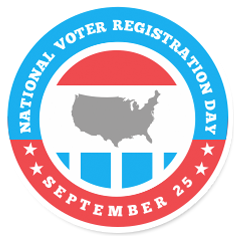Organize Your Voting Rights: September 25 is National Voter Registration Day
It has been said that democracy is the worst form of government except all the others that have been tried.
Democracy cannot succeed unless those who express their choice are prepared to choose wisely. The real safeguard of democracy, therefore, is education.
There’s a piece of paper out there that allows you to actively participate in our democracy, but first you have to be organized and obtain it. It’s a voter registration card.

Paper Doll doesn’t mind stirring up a little controversy when it comes to organizing issues (re: the utility of sticky notes vs. floozies or the wisdom of filing bills and statements by month vs. company). However, this post is non-partisan in that it provides information regarding organizing your time and possessions so that you can maintain your right to vote.
That said, it would be disingenuous (read: a big fib) for me to say I don’t care for whom you vote, but whichever candidates you support or side(s) of the issues you take, I’d hate for disorganization to get in your way.
If you are an American citizen over the age of 18 who cares at all about any of the following national issues (couched in the most balanced terminology I could create):
- The Economy
- Healthcare
- Energy
- Foreign Policy
- Veterans’ Affairs
- The Environment
- Immigration
- Reproductive and Family Issues
but are not yet registered to vote, please take heed. There’s not a lot of time left for you to get that voter registration card!
THE BASICS
1) Know your state’s voter registration deadline!
In most states, you must be registered to vote at least 30 days prior to an election. As Election Day 2012 is Tuesday, November 6, that would normally mean registering by Monday, October 8, 2012. However, that is Columbus Day, a federal holiday. Thus, in some states (Alaska, Arkansas, Mississippi, South Carolina, Tennessee, and Washington) the deadline may be as early as Saturday, October 6, 2012.
In a number of states, deadlines differ depending on whether you register by mail or in person. And, in the District of Columbia, Idaho, Maine, Minnesota, Montana, New Hampshire, Rhode Island, Wisconsin and Wyoming, you may register to vote on Election Day at your polling place. (However, Paper Doll strongly discourages you from waiting that long).
For what it’s worth, the predominantly rural state of North Dakota abolished voter registration in 1951. (However, if you’re new to town, start making yourself known to the people at the local diner in your precinct so your right to vote won’t be challenged.)
2) Know your state’s voting eligibility requirements.
Between 1812 and 1860, property ownership qualifications to vote were progressively abolished. In 1870, non-white men gained the right to vote, and in 1920, a mere 92 years ago, American women gained suffrage. In 1924, all Native Americans were granted the right to vote, and in 1971, the minimum voting age requirement was lowered from 21 to 18. However, even with federal regulations in place, individual states have distinct and varying rules regarding voter eligibility.
In general, in order to vote in federal and state elections, you much be a citizen, of sound mind, and over the age of 18.
Most states have residency requirements. However, in 1972, the U.S. Supreme Court struck down one-year residency requirements, stating that anything in excess of 30 to 50 days violated equal protection as granted under the Fourteenth Amendment.
Additionally, as part of the 2002 Help America Vote Act, homeless persons may not be denied the right to vote based on the lack of a permanent address. In 13 states (Alaska, Connecticut, Delaware, Florida, Georgia, Idaho, Montana, New Jersey, Utah, Vermont, West Virginia, Wisconsin, and Wyoming) and Puerto Rico, no mailing address is required, and in Arizona and Nebraska, homeless citizens may use county clerks’ offices and court houses as their mailing addresses.
Most states have regulations regarding the voting eligibility of convicted felons while in prison or on parole. In Florida, Kentucky and Virginia, convicted felons lose the right to vote in perpetuity.
Assumptions are not organized — do your due diligence regarding your eligibility to make sure nobody erroneously (or intentionally) blocks your lawful right to vote.
3) Fill out the paperwork to register to vote.
Of course, in many states, no actual paper is required and you can register online. The 14 states which allow online voter registration are Alaska, Arizona, California, Colorado, Delaware, Georgia, Indiana, Kansas, Louisiana, Maryland, Nevada, Oregon, Utah, and Washington (where you can actually register via a Facebook app).
Registering to vote is generally pretty easy. Call or drop by your Board of Elections to request an application. In 1993, the Motor Voter Act made it possible to register when you apply for or renew a driver’s license.
To find your local Board of Elections or begin the registration process, visit the League of Women Voters’ “Vote 411” voter registration page. Since today is National Voter Registration Day, there are events being held all over the country to help you get registered.
Once you’ve registered, verify that your registration has been successful.
4) Check the information on your voter registration card.
In most cases, your voter registration card will inform you of your voting precinct (which determines where you vote) and districts (i.e., Congressional, State Senate, State House, school district, county/city district, etc.) for individual campaigns, referenda and ballot initiatives. In communities where county and city limits are not entirely clear, it’s important to know exactly in which districts you reside so that you can research candidates and issues appropriate to your situation.
5) Keep your voter registration card in a safe place.
You don’t need to carry your voter registration card around in your wallet; just file it with your VIP papers in your family files, and make a notation on your calendar to bring your card to the polls on Election Day (or on early voting days, if your state allows voting in the days prior to an election).
6) Bring required identification to the polls on election day.
Many states have new legislation requiring, in addition to your voter registration card, photo identification. This doesn’t mean that you can bring your workplace ID, library card or student ID. You also can’t use your Social Security Card, Medicare Card, or Department of Veteran’s Affairs card. In most cases, you will have to present a STATE-ISSUED PHOTO ID CARD on election day.
It’s key to note that different states have different regulations. For example, in Tennessee, acceptable forms of ID include a valid driver’s license or other photo ID card issued by the Tennessee Department of Safety, valid passports and military IDs, and valid photo IDs issued by any other state. By comparison, in Alabama, valid tribal ID cards and student and employee cards from any Alabama college or university, will also count. In Kansas, government-issued concealed carry handgun or weapon licenses and government-issued public assistance ID cards will be accepted as identification. In Pennsylvania, an ID from a “personal care” facility, like an assisted living facility, will also suffice.
Familiarize yourself with the new legislation to make sure you have whatever valid, current identification is required in your state to ensure that you will be able to cast your ballot. Again, do not make assumptions that the laws have not changed in your locale. The Brennan Center for Justice at New York University School of Law has released a detailed compilation of Voting Law Changes in 2012, by state.
If you have none of the appropriate categories of identification required by your state, you will need to prove your identity in order to get a state-issued photo ID card. In most cases, this will require presenting a copy of your birth certificate. If physical limitations obstruct your ability to drive, contact your state’s League of Women Voters and a representative should be able to locate alternatives for transporting you to your department of motor vehicles to get a non-driver ID card, and to the polls on election day.
OTHER ISSUES
Have other concerns? Perhaps you’re thinking:
“I don’t care about national issues.”
We professional organizers try to persuade our clients that acquiring and keeping things “just in case” merely contributes to clutter. That’s true in most situations, but there are certain things we need to obtain (and keep accessible) “just in case” to preserve our safety and security. This includes (but is not limited to):
- driver’s license or identification cards
- Social Security cards
- credit reports from all three credit reporting agencies
- health care records
- passports
- insurance policies
- emergency funds
A voter registration card is like all of the above, allowing you to preserve your hard-fought, hard-won right to have your voice count. You may truly not care (enough) about any national political issues, but you never know when you’ll care about a school board vote that impacts your kids, a pothole on your street or a neighbor’s teenage beau,  boosting Peter Gabriel’s “In Your Eyes” at maximum decibels every night. Preserve your right to have a say in how your community (school district, town, city, state and nation) will be governed. Register to vote and get your registration card…just in case!
boosting Peter Gabriel’s “In Your Eyes” at maximum decibels every night. Preserve your right to have a say in how your community (school district, town, city, state and nation) will be governed. Register to vote and get your registration card…just in case!
“I don’t identify with just one party.”
Not 100% in the red or blue column? Not a problem. While many states require you to register with a particular party to vote in various primaries, you do not have to be a member of a political party to vote in general elections and in many other types of elections. Also, there are many, many other parties at the national, local and state levels, and in most states you can also choose to register as an independent, unaffiliated voter.
“I’m a U.S. citizen, but currently live outside the U.S. or am deployed in the military.”
If you are an American citizen reading Paper Doll from somewhere outside of the U.S., avail yourself of the following non-partisan sites to help you register and vote from abroad:
Federal Voting Assistance Program
Overseas Vote Foundation
Youth Vote Overseas
Election Assistance Commission
- “I’m not going to be in my political district/precinct on Election Day.”
If you will be away at college, traveling, disabled, or recovering from a medical procedure on Election Day, you can submit an absentee ballot by mail, but you must still be registered to vote by your state’s deadline. Register to vote, then contact your county’s Board of Elections or your state’s Secretary of State for an absentee ballot.
Organize your corner of society — register to vote!




Follow Me